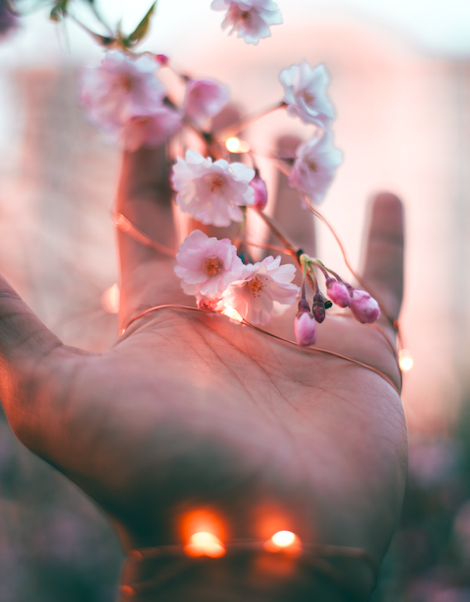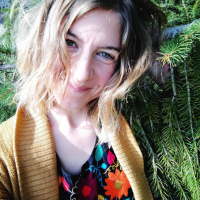Outside my windows, burgundy shoots are dancing on the ends of maple trees in their metamorphosis to leaves.
That these leaves begin their lives red as blood, long before they turn to green, is not lost on me.
What birth does not announce itself in blood?
We are less than a week from the spring equinox here in the Western hemisphere and yet the whole human world feels locked in the dead of winter. The natural world, however, is nudging us forward, whether we feel ready or not.
The frogs here have returned from their slumber, filling the night with their symphonies. The mornings are teeming with bird song. The dry bones of the forest are coming alive with tender green shoots and lacy white bells. Purple crocuses and delicate paperwhites, baby daffodils, and a few brave tulips are lifting their heads toward the sun.
A month back, I came upon a tree that had split in two at its base, flopping over in both directions. The half nearest me slung across a wooden fence, and I knelt down for a closer look. From the fingers of this broken tree, creamy pussy willow buds unfurled. I crouched there and kissed the buds as tears poured down my cheeks, for all I could see in this moment was a broken body determined to continue bearing life.
At the time, I was thinking of Australia. Mere weeks later, I’m thinking of us all.
A global pandemic will do that to us, won’t it?
There is nothing to romanticize about the coronavirus. I see people on both ends of the spectrum and everywhere in between, either pronouncing apocalypse or preaching that this will somehow be our messiah. I think the truth lies somewhere in the middle, waiting. This pandemic is bad, on so many levels, there’s no denying or trivializing or spiritually bypassing this. And there’s also beauty that can come out of it, a viral sort of kindness, if we so choose.
But I don’t want to debate those things here. Not now, not today.
Today, I want to talk about spring.
I want to talk about those blood-red promises of leaves. I want to talk about that broken tree’s offering of life. I want to talk about the birds that have kept me company through panes of glass during my weeks indoors. I want to talk about the flowers that persist in a late-season cold snap.
I want to acknowledge all the fear and panic and isolation and death, for these are real and huge and heavy and heartbreaking. But I also want to weep at the beauty of the Italian musicians and singers sharing their gifts with their neighbors from balcony to balcony. The people posting on social media with offers of groceries, errand-running, and deliveries to those in quarantine. The yoga instructors offering to live-stream classes to their communities. The people calling out racism toward East Asian neighbors. The ones visiting local small businesses before they close to purchase gift cards and supplies. The ones leaving large tips for service workers and setting up GoFundMe campaigns for the most vulnerable community members.
I think it’s safe to say no one forecasted the coronavirus in these first months of 2020, but here we are, smack-dab in the thick of the unimaginable. Life as we all know it has been drastically rearranged. How easily it could feel like the darkest, bitterest winter that will never end.
And still, spring arrives next week (or fall, depending on where you live), reminding us seasons shift.
I decided to celebrate the Wheel of the Year, beginning with Yule last year, as a way of deeply aligning with the seasons. Yule is a time of honoring the darkest of nights, the burial of seeds, as we turn to welcome the sun’s gradual return and the growth it will bring. Then Imbolc came in the beginning of February, the midway point between winter and spring—a time for looking back on what was sown and forward to what will be harvested. And soon, Ostara will arrive, our invitation to birth, to new beginnings.
My heart’s not really in spring mode, I’ll be honest. But I know this is a medicine I desperately need.
I think we all do.
Whether or not you celebrate Ostara, the spring equinox offers a sacred pause before new life unfurls. A chance to kneel again beside those seeds of intention planted at the cusp of the new year, regardless of what’s transpired since, and place them in the sunlight. Water them with active hope.
A chance to remind ourselves not to give up on the world we dreamed possible before the dead of winter—the bushfires, impeachment trial, war dance with Iran, election season, pipeline protests, Antarctic heatwave, Syrian refugee crisis, coronavirus, xenophobia, tornadoes, and plunging stock market—engulfed us. It’s all still there, a seed waiting to crack open.
Spring is the equalizer between light and dark. Death and life. Barrenness and birth. And whether we feel it or not, we’re offered the gift of shifting into new beginnings along with the natural world.
As the Earth awakens from her slumber, pushing life from her womb into the world, so can we. It’s a natural cycle and it’s a courageous choice.
And if most of us are indoor-bound when spring arrives, we can still find those rays of light, perhaps from a balcony or a window looking out on the world. We can brew ourselves a cup of tea, sit in all that is broken and all that is beautiful, and offer a quiet word of thanks for the life that holds us steadfast, against all odds.
For the life that is being birthed all around us, in us and through us, all over the world, from the blood-red buds.
Ready or not.
~







Read 24 comments and reply